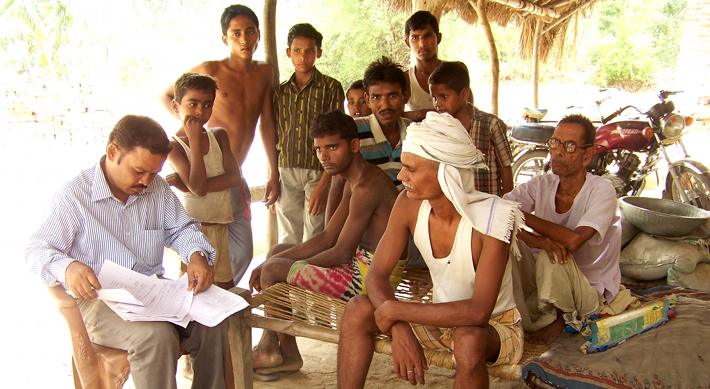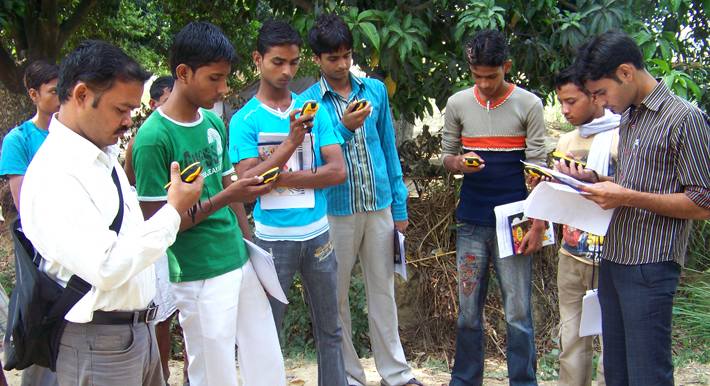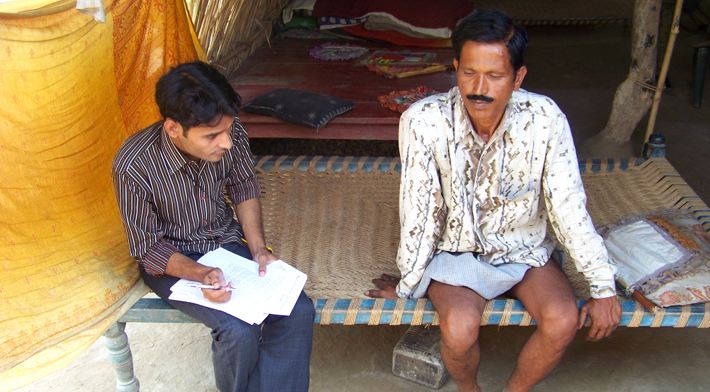Today, the Center for Innovative Financial Design (CIFD) has launched the endline survey of its project on contract enforcement in water markets in rural Uttar Pradesh. It will shed additional light on the appropriate interventions to overcome obstacles in irrigation markets in rural India. For that purpose, CIFD has recruited and trained field teams to survey more than 900 households in 22 different villages of Sitapur District over the course of the next 5 weeks. The training comprised different theoretical as well as practical sessions such as using GPS devices, using the survey questionnaires, and data quality management. The questionnaires that have been extensively field tested in the last 10 days cover various aspects related to water trade in rural areas such as pricing, mode of payment, and social relationships between water buyer and seller.

CIFD’s Survey Supervisor Mr. Bipin Gena piloting the Endline Survey questionnaire
Some background info on the research project: often we tend to romanticize about life in rural India, particularly, the social aspects. A common perception is that villagers have lived together for generations and the social interactions they engage in are not marred by conflicts. Such a milieu would facilitate the initiation of informal contracts amongst villagers which unfortunately is not often the case given anecdotal evidence from our field research in the dusty Hindi heartland of rural Uttar Pradesh.

In our preliminary fieldwork on irrigation markets in villages that encompasses the buying and selling of water through engine rental for irrigation of fields, we found that farmers do not undertake additional irrigation that would result in a significant increment in their output.
Pictured above: Survey field team members familiarizing themselves with GPS meters during the survey training
This is due to the paucity of funds to pay for such irrigations before the monsoon when they are most needed. For our randomly created sample water buyer-water seller pairs, we define a water seller as a farmer who owns both an operational bore-well and an operational engine. The matched water buyer in the same village is a farmer without an engine who owns a plot capable of being irrigated with water bought from the seller. GPS devises help to locate all households in the sample.

From today, the survey rolls out
The pertinent question here is why water sellers are not allowing water buyers to pay for irrigation cost or at least a part of it after the harvest when they get lump-sum payments. In return they could charge an extra fee from water buyers for delayed payments. The existence of irrigation credit markets within water buyer-water seller pairs seems to be natural if we consider farmers to be economically motivated.
But this is not the way things are on the ground. One of the reasons could be the difficulty in contract enforcement in rural areas. The experiments we carried out last year aimed to introduce variation in enforcement institutions for farmers and look at effects on bargaining over water sales. By providing subsidies in some cases to the buyers and in other instances to the sellers, we intended to observe a difference in irrigation transactions between these two groups if at all there are enforcement constraints in water markets.
Stand by for our findings when we complete the endline survey by July 2010.
—
Sanchit Kumar, Project Manager at CIFD, contributed this post.


4 Responses
I Congratulate CIFD for this initiative as I see this as an important area to be explored. I have observed in Uttar Pradesh, how much money small and to some extent marginal farmers spend on water and thereby reducing on their profit margin. The other main reason observed was lack of water in canals and provision of electricity operated water pumps. Due to this farmers have to pay increased cost of diesel.
Very interesting. the enforcement problem is not unique to water markets, right? Are there patterns in terms of who people are willing to trade water with? Sort of like a trader extending pre-harvest credit to a limited set of farmers with who he has a long history of a transactional relationship
One goal of the endline survey is to delve deeper into this question of what determines trade. In terms of patterns so far, a preliminary result from the experiment is that caste differences between water buyers and sellers strongly predicted the amount of trade.
In the endline, we are roughly mapping out the choice set for each experiment participant by identifying the neighbors with surrounding plots with whom it is possible to trade. For each potential trader, we’re collecting information on past trading history and credit provision, caste information, and some indicators of personal and social ties. This will generate some patterns on what predicts a “good” trading match.
Layering our experiment results on top of this lets us go one step further. In the experiment, we basically selected one person from your choice set, and provided strong incentives to encourage trade with that person. The person we selected could have been a “good” or “bad” match (in terms of who you usually trade with). We’ll look at how the match quality impacts trading outcomes with the person we selected and with others in the choice set.
Thinking about match quality adds another element to contract design: The fact that trade is mutually beneficial to both parties is not necessarily enough. Who they are and the institutional forces that govern their interactions also may be quite important in determining whether they are successfully able to trade with each other.